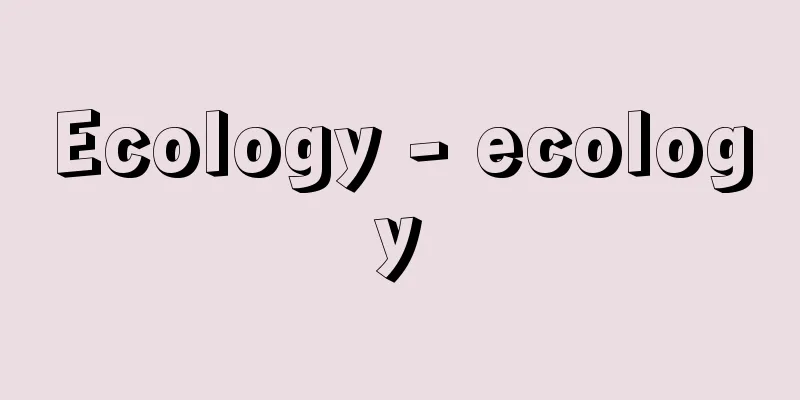Ecology - ecology

|
Originally, it referred to ecology, a science that studies the interrelationships between the environment and living things. The word ecology is the English transliteration of the German word Ökologie, which was created by the 19th century German biologist E. H. Haeckel by combining the Greek word oikos, which meant a house that was both a residence and a place of production for ancient Greek citizens, and logos, which means science. In recent years, as the problems of environmental destruction and resource depletion have come to be keenly recognized, these issues have become extremely common and serious to discuss, and as a result, the word ecology has gone beyond the realm of ecology and even natural science to become an indispensable word when thinking about the conditions and state of human existence. Recently, it has gone beyond being an academic term and has become an everyday expression meaning environmental protection and harmony with nature. [Miyakawa Nakatami] Ecology, ecologists, ecology movementEcologism, a comprehensive expression of ecological sensibility in politics, culture, and society, is not a single, unified academic system or theory, but rather an ideology and sensibility that aims for the coexistence of nature and humans. People who share this ideology and sensibility are called ecologists. Originally, ecologists were people who worked to preserve endangered species of plants and animals, and who criticized environmental destruction and pollution, but since the 1970s, people called ecologists who are developing a different movement from previous ones, as described below, have appeared all over the world as a new political force. At the United Nations Conference on the Human Environment held in Stockholm in 1972, the earth's crises and global environmental problems caused by industrialization, such as the destruction of ecosystems and the disappearance of species, increasing pollution, the depletion of energy resources, population growth, and hunger in the Third World, were discussed, and the Human Environment Declaration and Action Plan were adopted. It was against this historical background that a political and social movement called the Ecology Movement emerged, and one of the most important sources of this movement was the "youth revolts" that occurred all over the world from the late 1960s to the early 1970s. The Ecology Movement developed from the overlapping of the nature conservation movement, the regionalism movement, and the movement of people who were aware of the earth's crisis. This movement expressed itself particularly through rallies and demonstrations, but unlike previous social movements, it did not have a unified organization or leadership, and was seen in various places in a dispersed form, as it was described as "like a nebula." The ecologists who participated in this movement, with the anti-nuclear power plant movement as their core, expanded the scope of their accusations to include everyday life, consumer society, productivity supremacy, and technocratic control, as well as schools and medical care. As seen in the slogan "consume less, live better," they emphasized quality over quantity, and launched a movement calling for miniaturization, decentralization, and independence. At the heart of these ecologists' criticisms and claims was their critique of modern European values and the supremacy of science and technology. In Western European countries, the ecological movement has even made inroads into parliament; for example, Germany's Green Party won 27 seats in the 1983 parliamentary election. Since then, the ecology movement has come and gone, but as the Kyoto Protocol (1997) made the reduction of greenhouse gas emissions a global issue, it has moved away from its previous conceptual and philosophical debates and begun to address more familiar, concrete issues. However, in France, the youth revolts of the late 1960s left a significant mark, and activists from that time are still at the forefront of the movement. For example, in the European Parliament elections (June 2009) and local elections (March 2010), Ecologie Europe, led by Daniel Cohn-Bendit, a key figure in the May 1968 student movement (May Revolution), won over 20% of the votes in Paris and other major French cities, rivalling the Socialist Party. [Miyakawa Nakatami] Ecology and Economic SocietyHuman economic activity is a social phenomenon, but at the same time it also has an aspect of a natural phenomenon. It is an activity that exists within nature, extracts resources from nature, and, through the processes of production and consumption, discards some things back into nature. In other words, human economic society is a subsystem of the natural world on the earth's surface, and is in constant interaction with the natural environment. If we do not give sufficient consideration to this mutual interaction, as economic activity progresses, reactions from nature will bring about various kinds of difficulties and obstacles, and sometimes even put the survival of society at risk. Such problems became widely recognized by people through the environmental destruction and resource and energy problems that arose as a result of postwar economic growth. Through these experiences, a new academic challenge has emerged: the challenge of fully understanding the reality of the interactions between nature and the economy, and of clarifying what economic society should look like in relation to nature, through cooperation between the various fields of natural science, particularly ecology, and social sciences such as economics. "Environmental science," a field that must meet this challenge, is taking shape through cooperation between various sciences, and even within economics alone, new attempts are being made under names such as "environmental economics," "bioeconomics," and "ecological economics." Among the demands placed on economic society based on such ecological considerations, the items on which there seems to be a general consensus are: (1) restoring and preserving the diversity of biological species and abundant vegetation in the natural environment, (2) relying on the energy of sunlight, (3) realizing resource recycling in both agriculture and industry, and (4) using underground resources (including the use of synthetic and radioactive materials) with restraint and care so as not to cause significant changes to the ecosystem on the earth's surface. Naturally, the progress of new industrial technologies must contribute to meeting these ecological demands, or changes and developments must be made within the scope of those demands. [Kamizato] "An Ecologist's Manifesto, by Andre Gortz, translated by Taketomo Takahashi (1983, Midorifusha Publishing)" ▽ "Silent Spring, new edition, by Rachel Carson, translated by Yanichi Aoki (2001, Shinchosha)" ▽ "Ecology, by Dominique Simonet, translated by Yumi Tsuji (Hakusuisha, Que sais-je Bunko)" [References] | | | | | | |Source: Shogakukan Encyclopedia Nipponica About Encyclopedia Nipponica Information | Legend |
|
元来は、環境と生物との相互関係を研究対象とする学問である生態学をさす。エコロジーecologyという語は、19世紀ドイツの生物学者E・H・ヘッケルが、古代ギリシア市民の住居と生産の場を兼ねた家を意味するギリシア語のオイコスoikosと、学問を意味するロゴスlogosという語を合成してつくった、Ökologieというドイツ語の英語表記である。 近年、環境破壊や資源枯渇の問題が鋭く認識されるに至って、これらの問題がきわめて一般的に、かつ深刻に語られるようになり、その結果、このエコロジーという語は、生態学さらには自然科学の領域を超えて、人間の生存条件、そのあり方を考えるうえで不可欠なことばとなった。また最近では、学問上の用語であることにとどまらず、環境保護や自然との調和を意味する日常的な表現になっている。 [宮川中民] エコロジスム、エコロジスト、エコロジー運動政治、文化、社会におけるエコロジー的感性の総合的表現であるエコロジスムecologismは、一つのまとまった学問体系や学説をさすのではなく、自然と人間との共生を志向する思想であり感性である。こうした思想や感性をもった人たちをエコロジストecologistという。元来エコロジストとは、絶滅のおそれがある動植物の種の保存に努めたり、環境破壊や公害を告発する人々をさしたが、1970年代以降、いままでとは異なった以下に記すような運動を展開するエコロジストとよばれる人たちが、新たな政治勢力として世界各地に登場してくる。 1972年にストックホルムで開かれた国際連合人間環境会議において、生態系の破壊と種の消滅、公害の増大、エネルギー資源の枯渇、人口の増大、第三世界の飢餓など、工業化に伴う地球の危機や世界の環境問題が議論され、人間環境宣言、行動計画などが採択された。このような時代的背景のもとに出現したのが、エコロジストたちによるエコロジー運動といわれる政治、社会運動であり、その運動のもっとも重要な母体の一つとして、1960年代末から1970年代初頭にかけて世界各地で起きた「若者反乱」をあげることができる。エコロジー運動は、自然保護運動、地域主義運動、地球の危機を自覚した人々の運動などが重なり合い、発展したものである。この運動は、とりわけ集会やデモを表現手段としていたが、いままでの社会運動とは異なって、統一した組織も指導部ももたず、「星雲のごとく」といわれたように、分散した形で、各地でみられた。 この運動に参加したエコロジストたちは、反原子力発電所運動を核として、日常生活、消費社会、生産力至上主義、テクノクラート支配から、学校、医療に至るまで、告発の対象を広げていき、「より少なく消費して、よりよい生活を」というスローガンにみられるように、量よりも質を重視して、小規模化、非集中化、自立性などを課題とする運動を展開する。このようなエコロジストの批判や主張の中心には、近代ヨーロッパの価値観や科学技術至上主義に対する批判があった。西ヨーロッパ諸国では、エコロジスト運動は議会にまで進出しており、たとえばドイツの緑の党は、1983年の国会議員選挙において27の議席を獲得した。 その後エコロジー運動は離合集散していくが、京都議定書(1997)で温室効果ガスの削減が地球規模の課題になるにつれ、かつての観念的、哲学的議論を離れ、より身近な具体的問題に取り組むようになった。しかしフランスにおいては、1960年代末に起きた若者反乱が残したものは大きく、いまなお当時の活動家が率先して運動を行っている。たとえばヨーロッパ議会選挙(2009年6月)や地方選挙(2010年3月)において、1968年5月の学生運動(五月革命)の立役者ダニエル・コーンベンディットが率いるヨーロッパ・エコロジーは、パリをはじめとするフランスの主要都市で社会党に匹敵する20%を超える票を獲得している。 [宮川中民] エコロジーと経済社会人間の経済活動は、社会現象であると同時に、自然現象としての側面をもっている。それは自然のなかにあって、自然から資源を採取し、生産、消費の過程とともに、自然になんらかのものを廃棄する活動である。いいかえれば、人間の経済社会は、地表の自然の部分系(サブシステム)であり、自然環境との間に絶えざる相互作用をもっている。 この相互作用について十分な配慮を欠く場合、経済活動の進行とともに、自然からの反作用がさまざまな形の困難、障害をもたらし、ときには社会の存続を危うくすることもある。このような問題は、戦後の経済成長によって生じた環境破壊や資源エネルギー問題を通して、広く人々に意識されるようになった。 そしてこうした経験を通して、新しい学問的な課題が現れてきたといえる。それは、エコロジーを中心とする自然科学の諸分野と、経済学などの社会科学の協力のなかで、自然と経済の相互作用の現実をよく認識し、自然との関連での経済社会のあるべき姿を明らかにしていくという課題である。このような課題にこたえるべき分野として、諸科学の協力による「環境科学」が形をなしつつあり、また経済学に限っても、「環境経済学」「生物経済学」「エコロジー経済学」などの名称のもとに、新しい試みが行われている。 このようなエコロジー的な考察によって与えられる、経済社会への要求のうちで、およそ合意が得られていると思われる事項を記せば、(1)自然環境における生物種の多様性と豊かな植生を、回復し保存していくこと、(2)太陽光線のエネルギーに依拠すること、(3)農業と工業の両面において資源リサイクリングを実現していくこと、(4)地下資源の利用(合成物質、放射性物質の利用を含む)は、地表の生態系に重大な変化を与えることのないよう、抑制と配慮をもってすること、などである。当然、新しい産業技術の進歩も、このようなエコロジー的要求を満たすのに寄与したり、あるいはそれを満たしたりする範囲内での変化、展開でなくてはならないのである。 [神里 公] 『アンドレ・ゴルツ著、高橋武智訳『エコロジスト宣言』(1983・緑風出版)』▽『レイチェル・カーソン著、青樹簗一訳『沈黙の春』新装版(2001・新潮社)』▽『ドミニック・シモネ著、辻由美訳『エコロジー』(白水社・文庫クセジュ)』 [参照項目] | | | | | | |出典 小学館 日本大百科全書(ニッポニカ)日本大百科全書(ニッポニカ)について 情報 | 凡例 |
Recommend
Guardafi [Cape] - Guardafi
…the cape at the northeastern tip of the African ...
Calandrella
... The Melanocorhynchus genus, found mainly in A...
Ema Tokimori - Ema Tokimori
...Lord of Takahara-go, Yoshiki-gun, Hida Provinc...
Palladium chloride
Palladium(I), (II), and (IV) salts are known, with...
Kallisto (English spelling)
A nymph in Greek mythology. She lived in Arcadia a...
Synthetic sake - Goseiseishu
Sake with a similar aroma, flavor, color, and tex...
Rio de Janeiro (English spelling)
The capital of the state of Rio de Janeiro in sout...
Guadiana [river] - Guadiana
The second largest river in the Iberian Peninsula....
Four-colour map problem
A topology problem posed in the early 1850s. The q...
Shinkichi Hashimoto
Japanese linguist. Born in Tsuruga, Fukui Prefect...
Eskilstuna (English spelling)
A city in Södermanland County in southeastern Swed...
Hydrophobic sol (English spelling)
...Hydrosols use water as a dispersion medium, wh...
Representative of interests - Rieki Daihyo
Representatives elected to realize the interests ...
Corinna - Korinna (English spelling)
Date of birth and death unknown. Ancient Greek fe...
Black mold
...Awamori Aspergillus awamori Nakazawa is used i...



![Gaspe [Cape] - Gaspe](/upload/images/67d006c97d484.webp)





